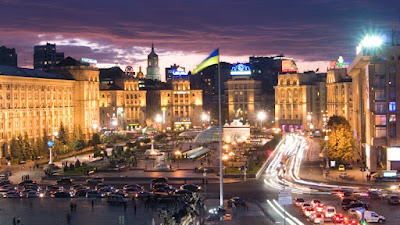by Hillel Fendel
What will Israel do in the event of a large-scale Russian invasion of, or attack on, the Ukraine? The question is not simple to answer, as Israel has good relations with both Russia and the United States – and certainly is not interested in tipping its hand too early.
At the weekly Cabinet meeting this Sunday, Prime Minister Naftali Bennett instructed the Cabinet ministers not to comment publicly on the Russian-Ukrainian conflict. Despite this, at least two of them simply could not resist – giving a glimpse into both Israel's position vis-à-vis the war that might develop to our north, and the frailty of Bennett's coalition government.
Possible future prime minister Yair Lapid, leader of the Yesh Atid party and a senior member of the government who expects to succeed Prime Minister Naftali Bennet 18 months from now in accordance with the coalition agreement, gave away some Israeli leverage on Sunday. He said, "If war breaks out between Russia and the Ukraine, Israel will side, naturally, with its traditional ally, the United States, despite our interest in safeguarding our good relations with the Russians." He even added that Israel would likely join the West in placing sanctions on Russia in the event of an attack.
Lapid also noted: "We have to be more cautious than the Americans, and they understand that. Israel has two problems that the U.S. and Britain don't have: a border with Russia, which is actually our border with Syria, and also the fear for hundreds of thousands of Jews in both Russia and Ukraine."
Minister Nachman Shai (Labor) also found himself unable, or unwilling, to follow Bennett's order to keep mum on the issue. He told a popular morning radio program on Sunday that regarding the question of imposing sanctions on Russia, "We will try to avoid reaching that place. I assume that Israel will side with the camp that is closer to it, namely, the West. Our loyalty is first of all to the United States."
The two were sorely criticized by some nationalist elements. Journalist Amit Segal said, "What was not clear in Bennett's instruction not to talk about this topic?" His colleague, radio host Yinon Magal, said similarly, "I don't understand what was unclear with this thing of not talking about it. Why do they have to hint about our plans? Don't they understand where we are? What is going on here!?"
On the Ground
In the meanwhile, Russia continues to stream forces and heavy weaponry towards its border with Ukraine, augmenting tensions not only in the area, but around the world. Russian President Putin announced last night his recognition of the secession of two additional parts of eastern Ukraine: Donetsk and Luhansk. This follows the belligerent Russian annexation of Crimea from the Ukraine in 2014.
In his dramatic speech last night, Putin said he simply wanted to right a historical wrong: "Why did we have to transfer the rights to these territories which were historically part of the Russian empire [a reference to the breakup of the Soviet Union in 1991 when Ukraine, including Donetsk and Luhansk, became an independent country]? Why? Why? Why did we have to be so generous? Why did we give those republics the right to just leave without giving us anything in return?"
Putin then ordered what he called "peacekeeping troops" into the areas in question. He later clarified that his gripes against what happened during the breakup of the Soviet Union apply only to the Ukraine, and not to other countries formed at the time, such as Lithuania, Latvia, Georgia, Armenia and others.
The U.S., England, and Germany have already begun to place economic sanctions on Russia, as a result of its latest actions against Ukraine. However, regional geopolitical expert Dr. Guy Bechor feels that the relatively lukewarm response of US President Joseph Biden and the other Western powers means that Ukraine has essentially been sold down the river.
A Forceps Operation
Dr. Bechor reports that Russia has apparently already initiated a planned forceps attack from Ukraine from both north and south, seeking to cut the country in half. Hundreds of tanks and other heavy weaponry are currently on their way southward from the Russian city of Belgorod towards the border with Ukraine, just 40 kilometers away; continuing southward, that border is only another 40 kilometers away from Ukraine's second-largest city, Kharkov.
On the other hand, throngs of Russian tanks in the Crimean peninsula, just south of mainland Ukraine, are also poised to head northward. The plan is thus for Russian forces to cut Ukraine in half from north to south.
It is estimated that there are currently 100,000 Jews in Ukraine, down from 400,000 before the large-scale Aliyah to Israel some 30 years ago, and from about a million before the Holocaust. Some 75 Ukrainian Jews made Aliyah this week, and a few hundred more, at most, are expected to follow in the coming weeks.
